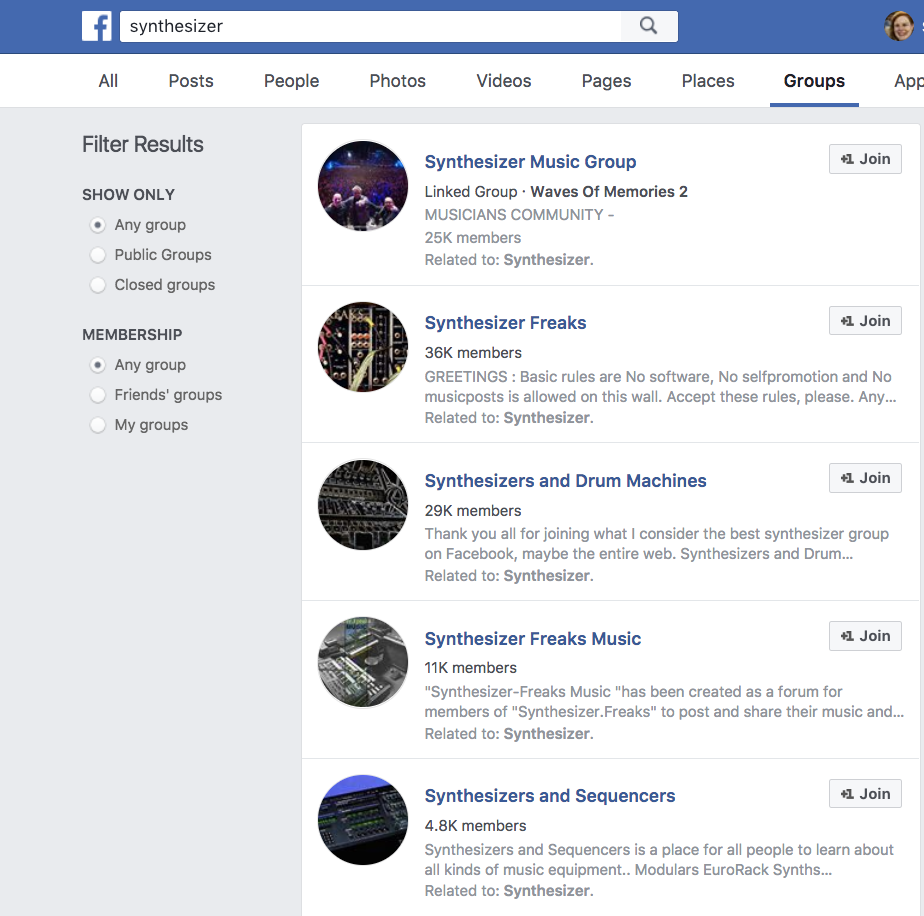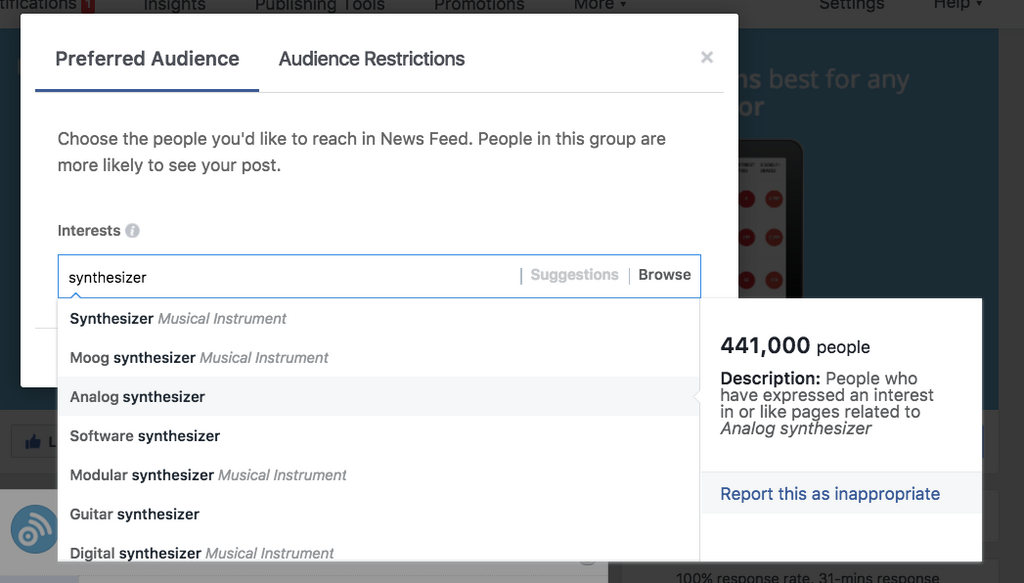If your business works well on social media, and you don’t have a Facebook Group, then you could be missing out!
Groups offer powerful new features, including the ability to ask questions when someone joins the group. I used this to capture more than 1000 email addresses. More importantly, Facebook Groups offer additional audience insights if the group has more than 250 people. No other social media platform even comes close to providing this much information, and it’s even better than what’s provided by a Facebook Page.
Aside from the generic reporting already provided by a Facebook Page (tracking membership performance trends, determining peak interaction days/times, keeping track of demographic and location data etc…) there is one report in particular that is GOLD for any marketer .
In this article I explain how you can use this data for a killer content marketing strategy.
You’re kidding… my content marketing strategy writes itself?
Yes, that’s exactly what the Top Posts component of the Content Engagement Report does – and it’s pretty spectacular! The report shows you which posts delivered the most engagement (comments, likes, and views) from the last 28 days.
I’ve blocked out the majority of the text because a lot of it is quite personal for this particular group, although I’ve left two questions from members interested in gastric bypass surgery.
The report is like seeing into the mind of your customer. This is particularly interesting, because this data can’t be produced this cleanly on any other social media platform. Let me explain:
Facebook groups are a forum for discussion and sharing ideas. Facebook has the most active users out of any social media, creating the highest potential for statistical significance due to sample size.
Also, the accuracy of the data is a huge factor. The fact that each comment is coming from a real person (not hiding behind a username/alias on a forum) means that the conversation is far more authentic.
Here are two content marketing ideas for using the information within the example above:
-
First Question:
One group member asked, “I am 8 days past gastric sleeve survery. Can I have grape juice? Apple Juice?”
Content Strategy Idea:
Create a blog article targeted at those who are 8 days post weight loss surgery, and answer the question about whether they are able to have different types of juices. This article can then be linked on the group to provide an answer to the question, and as reference material for future members.
-
Second Question:
Another member asked, “What is your favorite brand (of) protein bar?”
Content Strategy Idea:
Develop an article recommending different protein bar brands that are suitable for after weight loss surgery. If the client also has an ecommerce store that stocks a suitable option, a call-to-action within the article to purchase on the website will work well here.
That’s all well and good… although can this data be replicated?
I decided to do some outreach to see if I could get access to the ‘Top Posts’ report within other groups by private messaging group admins. I had some difficulty in convincing them that I wasn’t going to use the data for evil (because I wasn’t a part of their community), although I managed to gain access to some extremely valuable reports:
Group Name : We Love Craft Beer – Australia
Admin: Nigel Ayling
Question: “What do you class as your local?”
Content Strategy Idea: If I had a craft beer business, I would create a blog article on the website titled: ‘What I class as my local’. This would be an opinion piece, and as a bonus writing help, I would use the content within the comments (118 of them) to develop a rounded discussion of what a ‘local’ drinking spot actually is.
Group Name : Synthesizers and Drum Machines
Admin: Todd Smith
Question: “Who is your favorite synthesizer wizard?”
*Content Strategy Idea: Again, assuming I owned a synthesiser import business… I would use this information to create a piece of content that was focused on musicians that I considered pioneers of the synthesiser sound. The article could be titled: ‘10 synthesiser wizards that have pioneered the sound’. The blog would have the Disqus plugin enabled, allowing blog visitors to have add their opinions on-site.
Bonus influencer tip:
This approach would also create a natural opportunity to reach out to expert musicians, industry insiders, and equipment providers, to get their opinion. Those mentioned in the article could be tagged in posts as well.
To get started, find Facebook groups within your industry that have the audience you’re looking to attract. Then, use the publicly available information to identify the admin of the group and reach out.
Here’s the best idea you’ll hear all week :
Go out and find a group that you’d love to get these insights from. All you’ll need to do is befriend an admin and ask to see their analytics. I spent 20 minutes reaching out to the admins above and look what I was able to get.
Many admins are interested in growing the size of their group, so offering to include a link to the group page in your article is a good way to thank them for their help.
Can I find these types of insights, without being given access by an admin?
Unfortunately, it’s impossible to access the Analytics of a group if an admin doesn’t feel comfortable in passing this information on. This may be because they are concerned about the confidentiality of their members, or perhaps they own a business attached to the group that you may be competing with.
You can also take the long view and begin your own group. It will provide these types of insights for you on an ongoing basis.
If you already have an established business and have a good following on your Facebook page, then it will be simple to direct your following to join the conversation on your group.
Begin by looking to see what groups already exist in your content area. Search Facebook and select “Groups” to filter results.
If your initial group idea is already taken, consider providing a group for a smaller subset of the audience.
For example, there are many content marketing groups on Facebook, but only one for Women in Content Marketing
In the synthesizer example, you might consider a local angle –synthesizer experts in Manhattan, Australia, or the UK. Whatever works!
You can use Facebook’s free targeting option to determine how large a potential audience is.
Simply begin a post on any Facebook page, then click the targeting option. Type your main topic in as a interest, and Facebook will auto suggest variations of that term, and tell you how many users are interested in it.
Are Facebook Groups the Only Option For Customer Insights?
The Facebook Group strategy I have outlined here is a variation of what Lee Odden describes
as the “Be The Best Answer” approach to customer questions.
If you’ve spent some time doing outreach to admins and haven’t had any success, and you are still waiting for your own group to take off, there are other options for identifying questions, including BuzzSumo’s new Question Analyzer tool.
With the tool, you’re able to find the same type of insights as you would in a Facebook group, but these come from various forums, ecommerce sites, Q&A sites, and even Reddit.
Let’s use the Synthesizer import business as an example, and see what our findings are.
The first step is to use key terms that might be part of the question, and submit as the input within the Question Analyzer search field. Because we’re trying to produce the same output as the Synthesizer Facebook group example above, let’s broadly use the terms “synth artist” which should hopefully provide enough results, so we can quickly locate our answer.
Upon submitting my search, I’m presented with 86 questions which have been sourced from industry-specific sites like DIY Audio, Vinyl Collective, and Psy News. The list itself is helpful as it’s focused on a very specific niche, and I might not have found them on my own.
While sifting through the questions, I look for specifics I can use in my content or terms that I can use to craft more searches.
I found an ideal question located at the bottom of the first page of BuzzSumo’s results:
Again, I’ve struck gold in my search for content marketing mastery.
It’s now your time to shine by creating content that is scientifically proven to perform well. Use the ‘applications’ provided above to build an engaged community and direct them to your call-to-action!
Final thoughts…
Creating a community around your business is without a doubt the smartest approach for success on social media. Not only will it fuel your business operations, it will result in more longevity to your brand which doesn’t just depend on the product.
I’ve seen the combination of a Facebook group and BuzzSumo’s Question Analyzer work time and time again for content marketing success. As always, I would love to hear your thoughts on this approach and what obstacles you can see in putting together this framework for your own business.
Brodie Clark is an Australian SEO Consultant, operating under the name Brodie Clark Consulting. Focused primarily on helping mid- to large-sized companies take their SEO to the next level, his work is well-known for in-depth site audits with a special focus on algorithm updates. You can find his writing published on sites such BuzzSumo, SEMrush, Search Engine Land and Search Engine Journal.
Categories
Social Media MarketingCategories
Social Media MarketingThe Monthly Buzz⚡
Subscribe to BuzzSumo's monthly newsletter to:
Stay up-to-date with the best of the best in content marketing 📝
Get data-informed content, tips and tidbits insights first 👩🏻💻
Read top shared content by top marketing geeks 🤓
Try
Enter any topic, term or url to search to see BuzzSumo in action. It’s free!
100% free. No credit card required.






